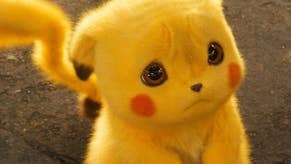Detective Pikachu Returns review - a textbook mystery that owes everything to its charm
The adventure of the geek interpreter.
What would a world shared by humans and Pokémon really be like? It's something I imagine every Pokéfan has pondered, and yet it's also something the series' main games typically do a poor job of showing. Red and Blue, Gold and Silver, all the way to Scarlet and Violet - the story never really changes. You play as the 10-year-old version of an RPG murder hobo, storming about capturing monsters to defeat enemies, then storing said creatures inside a computer when they're no longer of use. I've always held a softer spot for the Pokémon anime, which offers a more slice-of-life take on the traditional Pokémon game story, and better features the other kinds of people who exist in the series' world. It's been interesting to see, over the years, the wider Pokémon franchise include more of the anime's elements elsewhere - for example, leaning more heavily towards the concept of people having one special 'partner' Pokémon, as is the case here.
This is why I think I enjoyed the original Detective Pikachu game, which launched for Nintendo 3DS in Japan all the way back in 2016. (The movie adaptation was fine too.) A serviceable crime-solving adventure for a younger audience, its strengths lay in its world and characters, and the relationship it built between Pikachu and young human hero Tim Goodman, who share a unique and mysterious bond. Perhaps unsurprisingly, the same strengths can be found again in Detective Pikachu Returns, a belated sequel for Nintendo Switch, where the same connection between its main characters goes a long way towards balancing its fussy mechanics and an at-times frustratingly obvious plot.
Let's recap. Detective Pikachu on 3DS ended with something of a cliffhanger, as Tim's detective dad Harry was left missing while the nature of Detective Pikachu's abilities remained unknown. This differs, of course, from the end of the movie adaptation, which saw the truth behind Ryan Reynolds' Detective Pikachu play out on screen. Otherwise, both versions of the tale involved Tim and Pikachu investigating a mysterious chemical that enraged Pokémon and made them dangerous to humans, destroying the delicate balance between people and Pokémon found in the game's setting of Ryme City. Now, Detective Pikachu Returns picks up the action two years later, as a questionable quasi-police force for Pokémon crimes is established, and the mysterious Mewtwo - who was somehow involved in Harry's disappearance - suddenly returns onto the scene.
Newcomers who didn't play the original will be caught up to speed and there's even an acknowledgement of the Detective Pikachu movie, which is canonised in-universe as a big screen dramatisation that took liberties with some of the game's events (as film versions often do, Pikachu notes). Tim is a little older here, though still something of a generic hero figure. Detective Pikachu, meanwhile, is once again the star of the show, leaping into action as the duo get stuck into their first new case in some time - that of a missing jewel stolen from a nearby mansion, with the household's butler in the frame. Investigations play out as before, with you typically controlling Tim as he collects evidence by exploring a series of small environments. You can then gain further insight from questioning subjects, with Tim handling human interrogations and Pikachu talking to Pokémon.
Objects and statements of interest are now plotted in a casebook, which Pikachu prompts you towards once you've exhausted everything else to do in an area. From here, the duo discuss what has been learnt so far and pose questions about the case, though there's little actual detective work required. Rather than having to match pieces of evidence or statements together, you simply have to pick from a small selection of possible answers - and by this point the outcome has typically been spelt out. The same simplicity is found within the game's more focused investigation mode, where you roam your magnifying glass around a specific spot and select things to zoom in on. This is sometimes used to dole out plot exposition from documents or audio recordings on a desk or shelf, but more often than not adds an unnecessary delay to the proceedings when you are asked to examine something that's already obvious. For example, picture a scene where clear signs of a disturbance must be investigated with each broken item or scuff mark acknowledged before Tim can ultimately declare... this was indeed where a disturbance took place. (And to think this game begins with Tim getting a medal for his detective prowess.)
Other sections of each investigation thankfully offer a little more variety, with most cases including an additional Pokémon that Pikachu can call upon to investigate further - such as a Growlithe you can use to track scent trails, or a Luxray with the ability to see through walls. Gameplay occasionally switches to Pikachu himself, and there are a limited number of straightforward stealth sections where you must sneak around without being spotted. Each chapter also offers simple side-quests, typically activities that elongate your time with the game further via a bit of extra backtracking, in return for a few amusing moments with other Pokémon species. Helpfully, each main case is typically solved within a day or so, and then it's back to Tim's apartment to regroup and move the game's overall plot forward. It's not a long game overall - my completed save with all sidequests sorted was just over 12 hours, though this felt about right for the amount of story included.
Individual cases are engaging insomuch as they offer more chances for Pikachu and Tim to interact with each other and other Pokémon, and dig into the game's larger story, though don't expect any twist you won't see coming. Without getting into the specifics of the overall plot, it again revolves around the balance between Pokémon and ourselves, and elements who might seek to disrupt that for their own means. Each chapter offers generally breezy fare, though things can at times take far too long to get where it's obviously going. Perhaps the game's most egregious story moment comes late on, when someone needs to be convinced they're unwittingly helping a clearly evil cause while standing inside what is clearly an evil lair in front of clearly evil equipment and an enormous evil spoiler is sat in full view behind them. The game is more subtle at entwining each of its individual cases into a larger tale, and teasing the wider mystery behind Pikachu and Tim's dad - though, even then, the game suffers somewhat from having to retread ground the movie covered already. (And surely if Tim and Pikachu did see the film version, they'd have some questions about Ryan Reynolds to mull over between themselves?!)
Thank goodness for Pikachu himself, whose adorable face (now clearly tweaked to look closer to his big screen version) and exuberant performance lift the proceedings throughout. Whether in goofy moments dancing at the Hi-Hat Cafe or in quieter sequences as he tries to reconcile what he remembers of Harry, hanging out with Pikachu makes sections that do feel a slog worth pushing through. Perhaps wisely, he can be called upon anytime for a quick skit or wisecrack about your current environment, as well as a story hint if one is ever needed. All of the game's Pokémon are pretty great, in fact, and are given enough personality that I'm again reminded of the franchise's anime, rather than its main series games. Not since Pokémon Mystery Dungeon have fans been able to see Pokémon natter quite so much amongst themselves about, well, us - and it's always interesting to hear what quirky comments they might have to share. As a window into the world of Pokémon I can't help enjoying this second slice of Detective Pikachu's story - though it's an experience I'd likely only recommend to similar Pokéfans.










